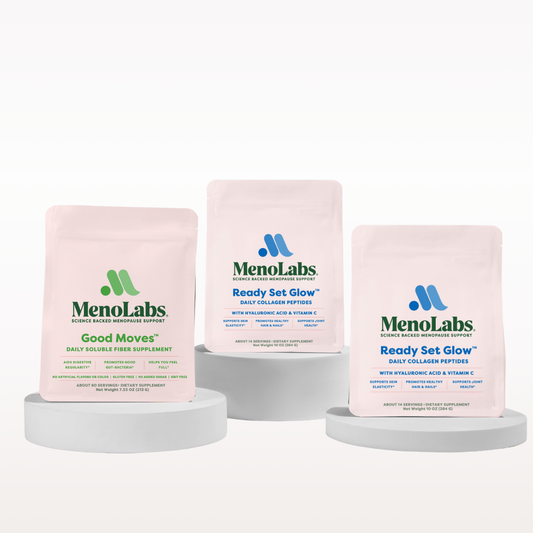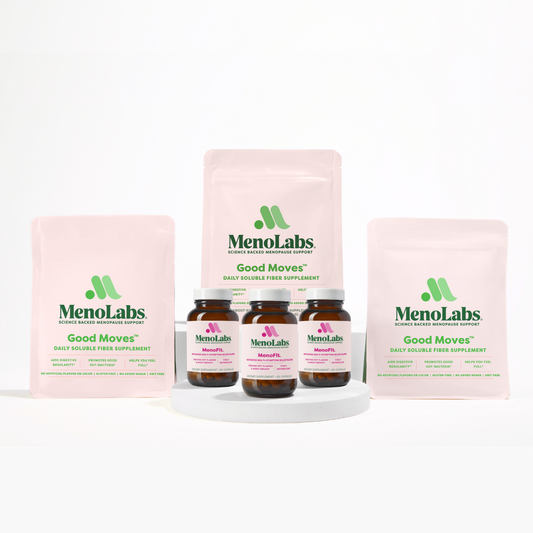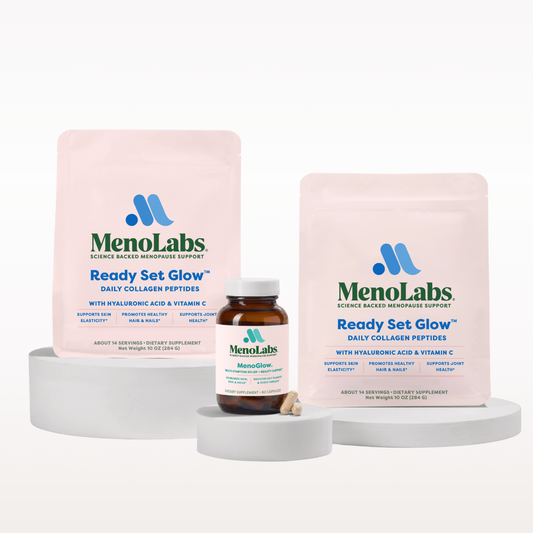
- Hot Flashes
- Mood
- Relationships
How Society Fails Women in Menopause (And What We Can do About it)
Society often treats the subject of women's bodies—and especially menopause—as taboo. Here's what we can do to change the conversation.
1 min read
Have you ever felt like you were left in the dark? Like everyone seemed to know what was going on except for you? Maybe this happened when you got your first period and didn’t know why you were bleeding “down there.” Perhaps you were shocked by those “other things” that happened when you gave birth.
When it comes to traditionally taboo subjects like menstruation and menopause, feeling left out of the conversation is, sadly, a normal occurrence. Society has made it clear that people (and by people, we mean women) should not openly discuss these topics. Sexism, anyone?
No matter what benign reason society has used for leaving us in the dark about our bodies, it’s time to take back control and educate ourselves and those around us about a very natural stage of womanhood; menopause. The most powerful way we can do this is by sticking together. To begin, we must understand how society fails us in the first place.
5 Ways Society Fails Women in Menopause
For years, society has regarded menopause as a physiological process women must deal with quietly. Like childbirth, perimenopause and menopause have been deemed phenomena we must suffer through in silence, “like a lady.”
Instead of being advised to see a doctor about our annoying and often painful symptoms, like hot flashes, heavy bleeding, migraines, and insomnia, too many of us have been told these “women’s issues” are something we must go through alone. Imagine telling someone with chest pain to suck it up and move on?
Here are the main ways in which society has failed women in menopause.
1. Being AgeistWomen associate menopause with being old. For centuries, society has made it clear that aging is nothing to be excited about, especially if you’re female. While men are valued for their grey hair and wrinkles, women who don’t keep up a youthful appearance or, worse, stop being able to procreate, are deemed less worthy.
2. Being SexistThose with a sexist view have long dubbed menopause as the ‘fatal’ stage of womanhood. According to society, once we go through “the change,” we essentially become non-women. We can no longer reproduce, setting us apart from our younger, procreative counterparts and leaving us to be deemed less useful. As such, postmenopausal women lose social value.
3. Declaring Menopause TabooFor decades, women have been trained to feel embarrassed by and avoid discussing hush-hush topics. Their mothers were taught by their grandmothers to keep quiet, slap on some lipstick, and pretend things like periods weren’t happening.
4. Lack of KnowledgeDue to a deficit of research, we don’t know all there is to know about menopause or how to properly treat its symptoms. That means there isn’t a lot of information for us to impart. The reason? Society deemed this topic less important than others such as heart disease, diabetes, and even erectile dysfunction, despite some menopausal symptoms being serious and debilitating. Thankfully, there is an increasing amount of research available, but we still have a long way to go.
5. Inequality at WorkThe 20s are the golden age for women in the workforce. Once women hit the 30 to 40-year mark, society sees them as a risk. The fact that these women might choose to become a mother makes them a less desirable employee. At 50, these women are again considered undesirable, this time because they may suffer from menopausal symptoms and are judged for their desire to work.
Despite a survey by Newson Health finding that 94 percent of perimenopausal and menopausal women are negatively impacted by symptoms at work, there’s still little to no help for them in the workplace.
Why Doctors Need to Step Up Their GameA lack of information about perimenopause and menopause can lead a woman to feel even more stressed, anxious, lonely, and depressed. As if hot flashes, mood swings, and vaginal dryness weren’t hard enough to deal with.
Due to the sexist nature of society’s views on this natural event, many doctors haven’t been well trained in helping us deal with our symptoms or guiding us through them.
Luckily, certain organizations like the North American Menopause Society are working hard to change this by offering training and mentorship programs and promoting knowledge around women’s health at “midlife and beyond.” But they need our help to promote awareness.
Together, We Can Create Change
The age of silencing women ends now! The more we band together and discuss menopause openly, the more likely people (especially those in the medical community) are to listen, and the less likely we are to feel alone.
Another bonus: the more we describe our symptoms and the dramatic effect they have on our lives, the more likely scientists will begin to conduct meaningful research. So, let's get talking!
Related Products
Blend Besties Bundle
Fresh Start Bundle
4.7 / 5.0
(553) 553 total reviews











